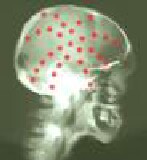
WEDNESDAY, May 29 (HealthDay News) — Depression and behavioral problems are common among children and teens with a type of epilepsy known as temporal lobe epilepsy, according to a new study.
Seizures involving the temporal lobe of the brain are associated with significant psychiatric problems, the researchers found. Because of this, psychiatric evaluations are important for children with epilepsy, especially those who don’t respond to anti-seizure medications and need surgery for their condition, the study authors pointed out in the report published online this month in the journal Epilepsia.
“Our research examined whether psychiatric illness was more prominent in children who were unresponsive to anti-seizure medications and had seizures in the temporal lobe versus elsewhere in the brain,” study lead author, Dr. Jay Salpekar of Children’s National Medical Center in Washington, D.C., said in a journal news release.
“In children who do not respond to drug therapy, epilepsy surgery may be the only option to improve their quality of life. Understanding the pediatric patients’ mental health status is important, as the severity of psychiatric illness may impact the overall risk-benefit of epilepsy surgery,” he explained.
The study involved 40 children with epilepsy who did not respond to anti-seizure medications. All of the participants, aged 6 to 17, were given psychiatric evaluations before surgery. Their parents also completed a child behavioral questionnaire. In reviewing the children’s case records, the researchers found the study participants had significantly more psychiatric and behavioral problems than what is usually reported in children with chronic epilepsy.
Nearly 80 percent of the children suffered from significant psychiatric symptoms, compared to the 20 to 40 percent prevalence of mental illness generally found in cases of children with chronic epilepsy. The children whose seizures were specific to the temporal lobe were more likely to be depressed and have more serious behavioral issues than kids who had seizures in other parts of the brain, the researchers noted.
“Given that psychiatric illness, particularly depression, is so prominent in those with temporal lobe seizures, routine psychiatric evaluation appears to be important not only for adults, but also for children and adolescents prior to epilepsy surgery,” Salpekar said in the news release. “In fact, it may be beneficial for most patients [who don’t respond to medication] to have a psychiatric assessment, regardless of seizure localization, to improve quality of life.”
Previous research has shown that up to 40 percent of children with epilepsy experience symptoms of depression, anxiety, attention issues and learning difficulties. Studies have also linked depression with temporal lobe seizures among adults who’ve had surgically treated epilepsy. The investigators added that more research is needed on the variables associated with mental illness symptoms in patients who’ve undergone surgery for epilepsy.
More information
The U.S. National Institute of Mental Health has more about epilepsy.

